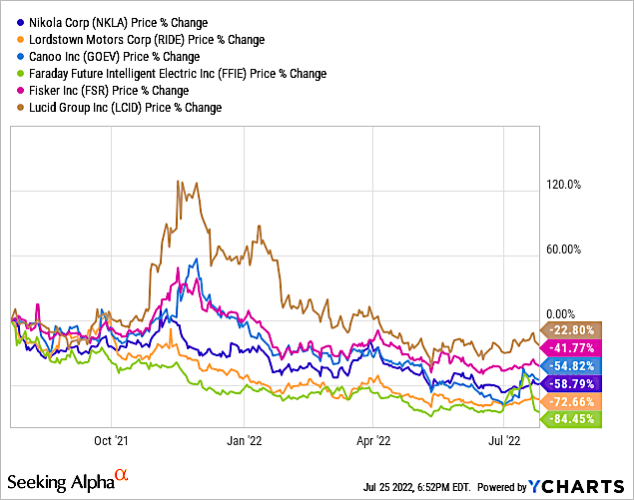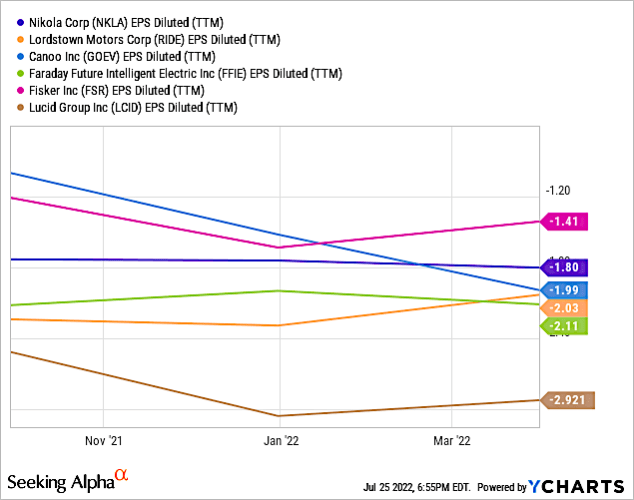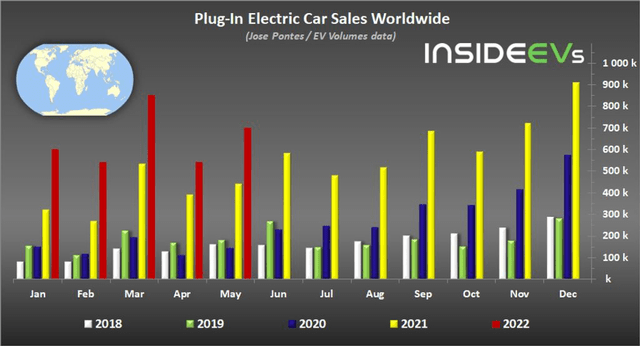stbaus7/iStock Editorial via Getty Images
When I was compiling data for my July 20, 2022 Seeking Alpha article entitled “What’s The Electric Vehicle Battery Market Outlook By 2029?”, I discovered a little-know factoid that plays into the high price of EV vehicles – the cost of “Brand Equity.”
Brand equity can be defined as the additional value that a recognizable brand name adds to a product offering, and is created as customers becoming increasingly and more personally aware of a brand and build a connection with it.
Increased competition has been a catalyst for spending money to promote Brand Equity of their products. About 50 new EV models are expected to debut in North America by 2024, and a flood of new supply makes for a competitive environment.
The advantages of Brand Equity, which gives a product competitive edge in the marketplace include:
- Developing a greater market share
- Charging a price premium
- Ease of Recognition
- Differentiation from the competition
When it comes to advertising, the average spend among traditional automakers is $495 per vehicle. In 2021, automakers spent $248 million on national TV ads featuring EVs, up 282% from $65 million in 2020.
In 2020, there were 8,000 national TV ads for EVs, and in 2021 that skyrocketed to 33,000. Meanwhile, TV ads for non-EVs fell from 563,000 in 2020 to 531,000 in 2021.
Shown in Table 1 is advertising spend per car sold, which includes EVs and ICEs.
Visual Capitalist
This table shows the value of “Brand Equity.” Tesla (TSLA) has one of the largest brand equity values and manages to spend $0 on advertising year after year. But then again, Tesla CEO Elon Musk has 102 million followers on Twitter.
Thus, Tesla is able to save the average of $495 per vehicle by having a high brand equity. This leads me to the purpose of this article. If a brand has existing brand equity before it releases an EV it is an incredibly powerful asset, providing surety of demand, saving potentially billions in marketing and advertising costs and time for adoption.
EV Technology Group – Changing the Dynamics of the EV Industry
One new EV entrant that has caught my attention while researching my previous Seeking Article is EV Technology Group (OTCQB:EVTGF) which was recently listed on the OTC and, in my opinion, is changing the market with management’s vision of “electrifying iconic brands.” According to its press release:
“EV Technology Group has recently acquired MOKE International, and has already started to roll-out the Electric MOKE, which has a range of 120km MOKE. EV Technology Group aims to bring iconic brands into the carbon-free future, while still speaking to its thousands of cult-followers across the globe.”
What’s Unique About This Approach?
According to an article in Robb Report:
“Named after a slang term for “donkey,” the funky MOKE quickly won favor with the era’s celebrity set, including Brigitte Bardot, Peter Sellers and the Beatles. It even had a supporting role in several James Bond films. And surviving examples have been owned by the likes of David Letterman and Kate Moss in recent years.”
Photo 1 shows that the MOKE is not an EV for your daily commute, unless commuting from the beach house to the golf course. I imagine these EVs as transportation for guests of an island or vacation resort, or rentals at a resort location, such as adding alternatives to reproductions of the 1957 Porsche 356 Speedster Convertible rented at Maui Roadsters.
Photo 1
MOKE
But the uniqueness to this acquisition is that MOKE International is an established auto company with Brand Equity. This differs from the traditional venture capital approach where startups raised upward of $20 billion in 2021, more than double the nearly $10 billion raised by companies in the sector in 2020.
SPACs are another approach and are publicly traded companies that don’t have any real assets other than cash. They are formed as investment vehicles with the sole purpose o
f raising funds and then finding and merging with a privately held company. It’s a faster way to take a company public than a traditional IPO, but many have run into both financial and legal trouble following a crackdown last year by the SEC.
EV start-ups Nikola (NKLA), Lordstown Motors (RIDE), Canoo (GOEV), Faraday Future Intelligent Electric (FFIE), Fisker (FSR), and Lucid Group (LCID) all went public through SPAC deals over the last two years.
Investor Takeaway
This unique approach to entering the EV market looks like an interesting pick for those who believe in the power of brands coupled with EV Technology Group’s ability to scale this strategy across more classic brands. They bring together a seasoned executive team – including CEO Wouter Witvoet who has founded companies like SecFi and Valour, and automotive executives like Dan Burge (former Lotus executive) and Isobel Dando (17 years at brands like Rolls-Royce). They have shown clear demand for the MOKE and ability to grow their “brand-first” strategy.
I mentioned above that other approaches have been made, using SPACs. Not only are there legal issues, but these companies have not been as successful, primarily because they have not established a brand equity despite going public through a shell.
Chart 1 shows the percentage change in share performance for these six companies over a 1-year period. All have exhibited significant double-digit share drops.
Chart 1
YCharts
Chart 2 shows EPS Diluted (“TTM”) for these companies. This is not meant as a comparison of EPS among the companies but serves to show that earnings for all have been negative over the past 1-year period.
Chart 2
YCharts
The rapid staccato pace of EV car introductions in recent years has been “fueled” by the war on fossil fuels, and while EVs grew 104% in North America in 2021, ICE (internal combustion engines) car shipments were flat.
In 2019, 2.2 million electric automobiles were sold worldwide, accounting for only 2.5 percent of total vehicle sales. The global automotive market shrank in 2020, but electric car sales grew, reaching three million units and accounting for 4.1 percent of total vehicle sales. Electric vehicle sales more than doubled to 6.6 million in 2021, accounting for 8.3% of the global car industry. Electric vehicles accounted for all of the net growth in worldwide car sales in 2021. Through May 2022, electric vehicle sales reached 3.2 million, accounting for 11.0% of the global car industry, as shown in Chart 3.
Chart 3
InsideEVs
The strong growth potential of EVs is a catalyst for start-ups to get to market as soon as possible. Unfortunately, many of these new EV players have similar futuristic-looking designs with similar if not identical engine technology. But they are not brands people know and love. The approach of EV Technology Group takes of acquiring a company with “Brand Equity” exposure is changing the market with a vision of their ‘electrifying iconic brands,’ and I’m monitoring future acquisitions for readers and subscribers.






